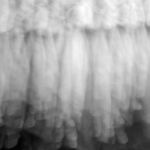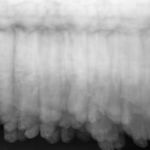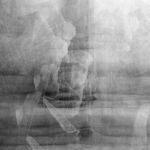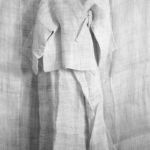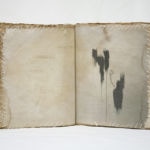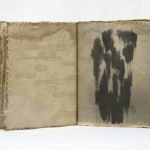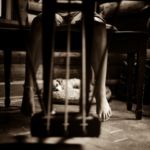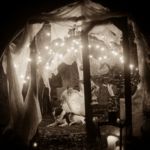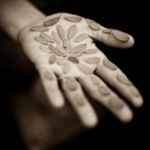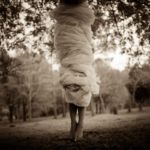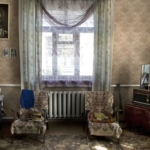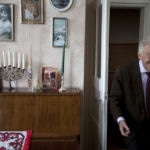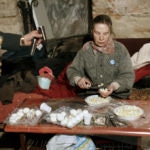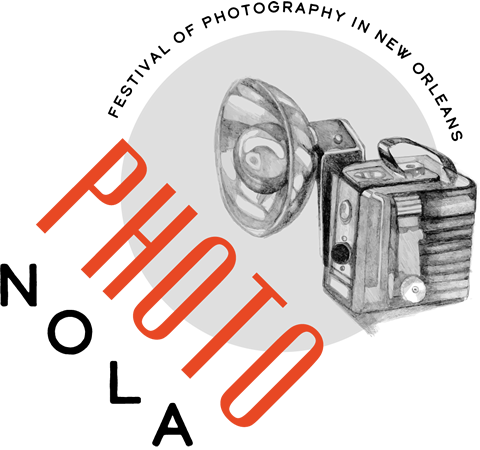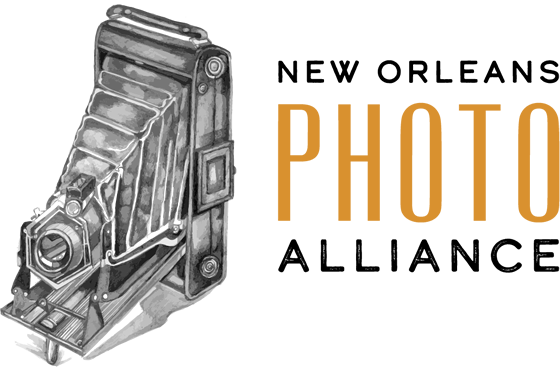Jungeun Lee, Lori Vrba and Loli Kantor were selected from among 63 photographers who attended the 2010 PhotoNOLA Portfolio Review.
For one weekend photographers had one-on-one meetings with influential editors, curators and gallerists assembled from throughout the U.S. and abroad. After the portfolio reviews concluded, each reviewer was asked to select three outstanding projects. Jungeun Lee received the most votes, earning her the PhotoNOLA Review Prize, which includes a solo exhibition at the New Orleans Photo Alliance Gallery during the Sixth Annual PhotoNOLA (in December 2011), 50 copies of her own Blurb book and a cash award of $1000. 2nd Place winner, Lori Vrba, and 3rd Place winner, Loli Kantor, are recognized with image galleries on the PhotoNOLA website.
Jungeun Lee
Jungeun Lee was born in South Korea and received a B.E. from Hoseo University in Korea. She earned an MFA in Photography from University of North Texas in 2010, and currently resides in Dallas, Texas.
In her project, “Silenced Suffering: The Comfort Women Project”, Lee metaphorically portrays the approximately two hundred thousand women who were involved in sexual slavery during the Second World War. Since Japan’s defeat, the comfort women have struggled through the physical and emotional consequences of their enslavement. Lee’s work quietly and powerfully evokes their testimonies in order to explore these tragic historic memories.
“Jungeun Lee’s ethereal photographs and meticulously hand-crafted objects eloquently document the experiences of the ‘comfort women’ from the second word war in a truly unique and personal manner.”
—Darren Ching, Klompching Gallery, New York
Lori Vrba
Lori Vrba is a fine art photographer based in Chapel Hill, North Carolina, who is committed to film and traditional print-making. Her work has been widely published and exhibited, both nationally and internationally.
Vrba’s series, “Piano Farm”, explores the connection between artist and place in the setting of Emerson Farm, where her daughter takes piano lessons. Her emotionally evocative images speak of youth and exploration, creativity and inspiration, all grounded in the rich southern landscape.
“Vrba’s lush split-toned photographs seduce the viewer with the perfect blend of fact and fiction.”
– Michael Itkoff, Editor, Daylight Magazine
Loli Kantor
Loli Kantor is a fine art and documentary photographer based in Fort Worth, Texas. She was born in Paris and raised in Tel Aviv, Israel and Buffalo, New York. Her work has been published and exhibited internationally.
Kantor’s project, “There Was a Forest: Jewish Life in Eastern Europe Today,” documents Jewish life and culture in Poland and Ukraine. An outgrowth of Kantor’s exploration of her own family’s history, the series combines color images and small palladium prints. With a vision that is tender yet clear-eyed, her photographs examine communities affected by the Holocaust and subsequent Soviet regime, capturing both the sorrow and resilience of her subjects.
“Loli Kantor’s photographs of contemporary Jewish life in Ukraine, There Was a Forest, are like jewels—richly colored and saturated, multifaceted, masterfully composed. The longer you look, the more you receive. The telling is in the details, and the story is a complicated one of survival and vitality—preservation and being—and of irreperable loss. Some of the communities she so tenderly depicts are about to disappear. Her small palladium prints complement the color work in surprising, delicate ways, and lend themselves to the overall layering of the past with the present.”
—Alexa Dilworth
Publishing Director, Center for Documentary Studies at Duke University
More About Jungeun Lee
Silenced Suffering: The Comfort Women Project
During the Second World War (1932-1945), hundreds of thousands of Korean women became “comfort women,” which is a euphemism for women forced into sexual slavery by the Japanese Imperial Army. These women were conscripted into many Asian countries from Korea and imprisoned at the military comfort stations. Since Japan’s defeat in 1945, many of them committed suicide or remained in foreign countries instead of returning to Korea, as they were ashamed and attempting to hide from their past. Since Japan’s defeat, the comfort women have struggled through the physical and emotional consequences of their enslavement for more than sixty years. To date, only two hundred women have testified about their ordeals out of the estimated two hundred thousand women whose lives were impacted by this experience. They overcame the difficulties of publicly speaking out in hope that their testimony would help prevent history from repeating itself.
Approximately two hundred thousand women were involved in sexual slavery in four hundred comfort stations during this war. In this project, I metaphorically portray the number of the comfort women and their testimonies in order to explore their tragic historical memories.
Bio:
Jungeun Lee was born in South Korea and received a B.E. from Hoseo University in Korea and a MFA in Photography from University of North Texas. During her study at the University of North Texas, Jungeun discovered a piece of korean history that she previously had not learned. This discovery led to the research and development of “Silenced Suffering: The Comfort Women Project”. She spent her entire 3 years of her graduate career researching and making work about this unknown history.
More About Lori Vrba
Piano Farm
My daughter Olivia began piano lessons at the age of 6, on an old upright nestled into a converted sleeping porch on Emerson Farm. Sara is her teacher and the farm’s caretaker. As an artist, I quickly realized I should always come with my camera and film. My relationship to the farm and to Sara grew from there.
This series speaks to the connection between an artist and a place of endless creative possibility. It is also my thank you note, love letter and deep curtsey to Sara for allowing me such freedom…a luxury for which I am forever grateful.
With this body of work, I not only want to share the visual charm of the farm itself, but also my own inspired experience of the farm and the imagery born from such a giving place.
The Piano Farm holds possibility at every turn. The ferel garden, the greenhouse of perfect light, the stable of two white horses named Elvis and Finnegan (who behave more like curious dogs than horses), the tiny log cabin where a Baby Grand takes the place of a breakfast table…all laced with the Bohemian touches of the free spirited and exuberant Sara.
My own artistic voice is free to sing there alongside the sounds of children at the piano. It is a place I trust, as it continues to welcome me into its wellspring of inspiration.
Bio:
Lori Vrba is an award winning, fine art photographer who is committed to film and her own traditional print-making. Her tough Texas upbringing and unconventional path into photography and the darkroom has shaped who she is as an artist. Her emotionally evocative work has been widely published, exhibited and collected, both nationally and internationally. Most days you can find her elbow deep in chemistry or chasing the next picture with enthusiasm, die-hard determination and a Hasselblad full of hope.
More About Loli Kantor
There Was a Forest: Jewish Life in Eastern Europe Today
Contemporary Judaism in Eastern Europe is a complex hybrid of lingering traditions and memories, a culture deeply influenced by the environment of post-war Soviet Ukraine and the relentless march of modernity. The title of the series, “There Was a Forest,” alludes to both the forest of the natural world, and the metaphorical human forest of Jewish life, both of which have been placed at risk of destruction by the force of technology, industrialization, and war.
For over five years I traveled repeatedly to Poland and Ukraine to photograph Jewish life and culture in the small remaining enclaves and larger communities. This project began while researching my own family’s history. Both my parents were Holocaust survivors; both were from Poland and lost nearly their entire families. As my research progressed, the scope of my project broadened beyond my own personal history. I was motivated by a desire to explore and document the continuing impact of the Holocaust, as well the legacy of the subsequent Soviet regime on the Jews currently living in these places. I found I was especially interested in the ways in which these communities were trying to preserve their Jewish identity during this time of transition.
While at times the images in this body of work carry somber undertones, the photographs and the stories they tell are also layered with joy and life. The vivid, highly saturated color prints convey the tangible reality of these places in a full palette of the region’s hues.
Along with the color works, I printed part of the project using original black-and-white negatives. The small palladium prints are reminiscent of snapshots taken in the 1940s, and evoke the past. Juxtaposed with the color works, they create a dialogue between past and present and a wider look at people and culture.
As this work sets the tone for memory, grief, and loss, it ultimately stresses strength and survival. It provides a unique perspective, representing what these communities look like today and how Jewish traditions and identity have endured despite hardships and persecution.
Bio:
Loli Kantor is a fine art and documentary photographer based in Fort Worth, Texas. Born in Paris, France, she was raised in Tel Aviv, Israel and Buffalo, New York. Kantor’s work has been exhibited widely in the United States and internationally in China, Poland, Ukraine, Spain and the Czech Republic. She was named one of the top 50 photographers in PhotoLucida’s 2010 Critical Mass competition and received an award of excellence for her solo exhibition in the 2009 Lishui International Photography Festival in China. She was an exhibiting artist in the 2010 Fotofest Biennial in Houston, Texas. Her work has been widely published with comprehensive features in publications such as LensWork, and is held in museum collections internationally.
